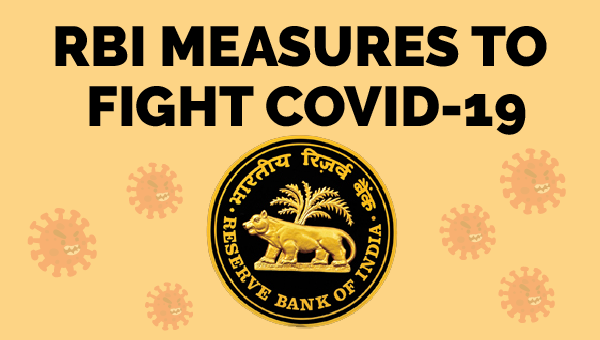RBI measure to fight COVID-19
Discover how RBI tackled COVID-19's financial fallout. Explore liquidity enhancements and support to sectors like real estate as part of RBI's regulatory and liquidity management measures
INTRODUCTION
- Since March 2020, the Reserve Bank of India (RBI) has taken numerous measures to fight the COVID-19 at the financial front. These measures also form part of the Special Economic Package and the ‘Atmanirbhar Bharat Abhiyaan’ recently announced by the Hon’ble Prime Minister of India, Narendra Modi.
- Various developmental and regulatory policies undertaken by the RBI to address financial stress caused by COVID-19 include:
- Liquidity Management
- Regulation and Supervision
- Decisions in respect of Financial Markets

LIQUIDITY MANAGEMENT
- Targeted Long-Term Repo Operations (TLTROs): RBI will conduct auctions of targeted term repos of about INR 1 lakh cr for fresh deployment in investment-grade corporate bonds, commercial paper, non-convertible debentures.
- Cash Reserve Ratio: As a one-time measure, RBI has reduced the cash reserve ratio of all banks by 100 basis points to 3% of Net Demand and Time Liabilities (NDTL) which will result in liquidity enhancement of about INR 1.37 lakh cr.
- Marginal Standing Facility: The limit of the banks for borrowing overnight has been increased from 2% to 3% into the Statutory Liquidity Ratio (SLR). This will allow additional liquidity of INR 1.37 lakh cr.

REGULATION AND SUPERVISION
- Moratorium on Term Loans: RBI has permitted all lending institutions to allow a moratorium of three months (later extended to six months) on payment of instalments in respect of all term loans outstanding as on March 1, 2020. These institutions include:
- Commercial banks like regional rural banks, small finance banks and local area banks
- Co-operative banks and all-India Financial Institutions
- NBFCs like housing finance companies and micro-finance institutions
- Deferment of Interest on Working Capital Facilities: RBI also permitted all lending institutions to allow a deferment of three months on payment of interest in respect of working capital facilities sanctioned in the form of cash credit/overdraft of all such facilities outstanding as on March 1, 2020.
- Easing of Working Capital Financing: All lending institutions are permitted by RBI to recalculate drawing power by reducing margins and/ or by reassessing the working capital cycle for the borrowers in respect of working capital facilities sanctioned in the form of cash credit/overdraft.
- Support to Real Estate Sector: RBI has permitted an additional time of one year for the extension of the date for commencement of commercial operations (DCCO) in respect of all loans provided by NBFCs to the real estate sector.

DECISIONS IN RESPECT OF FINANCIAL MARKETS
- In recent times, RBI has recognized the growth of the offshore Indian Rupee (INR) derivative market - the Non-Deliverable Forward (NDF) market and decided to remove segmentation between the onshore and offshore markets.
- RBI has now permitted banks in India to participate in the NDF market from 1st June 2020 through their branches in India, their foreign branches or through their International Financial Services Centre (IFSC) Banking Units (IBUs).
